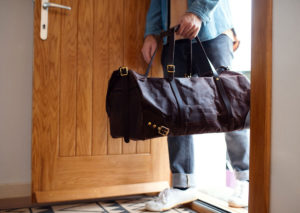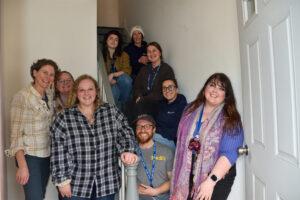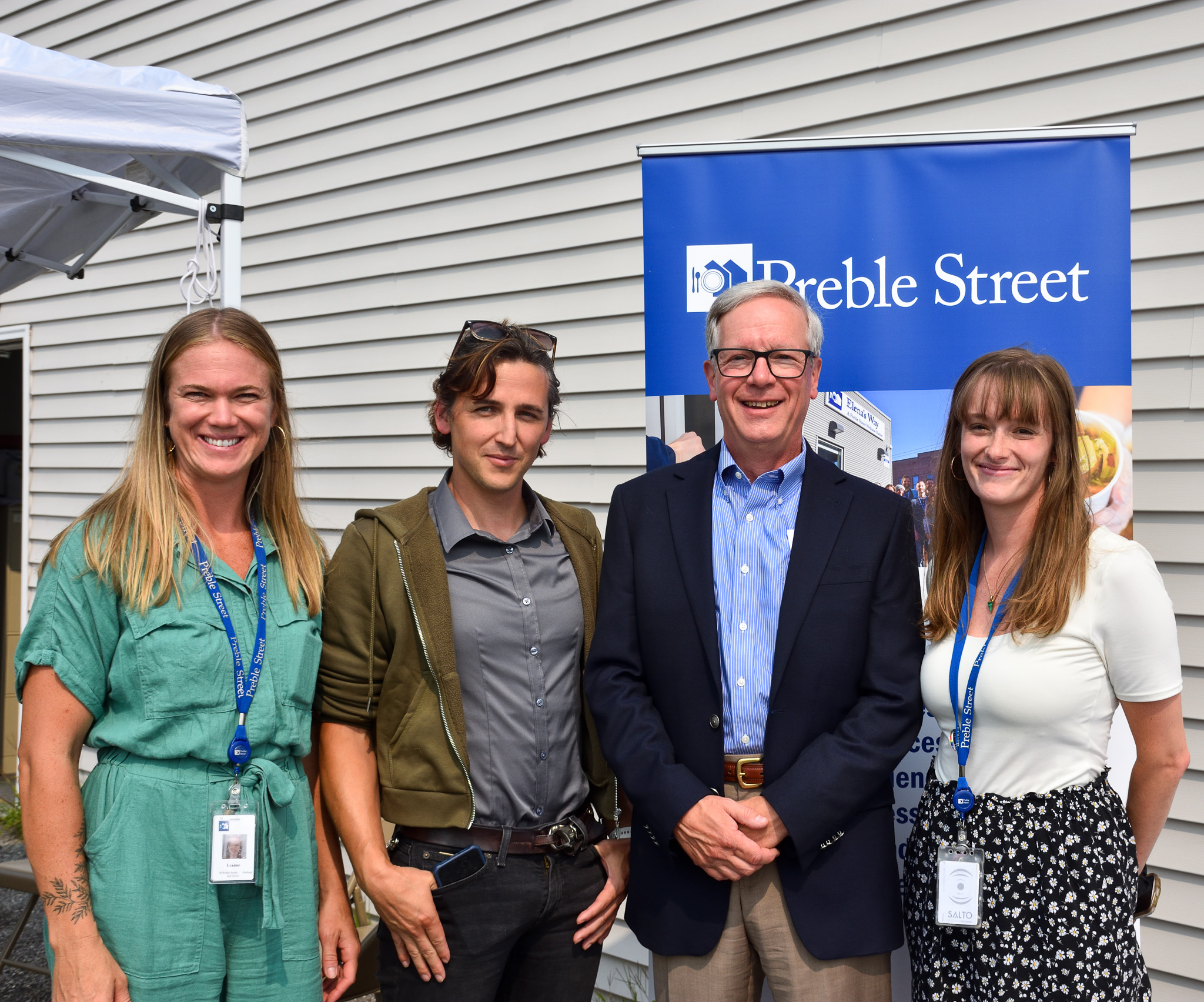Photo caption: Leanne Pomeroy, Director of Rapid Re-Housing, Preble Street; Zakk Maher, Deputy Director of Business & Community Development, City of Auburn, Maine; Mayor Jeff Harmon, City of Auburn, Maine; and Erin Kelly, Senior Director of Social Work, Preble Street gather to launch Rapid Rehousing in Lewiston-Auburn.
On Monday, August 12, 2024, Preble Street officially expanded its Rapid Re-Housing program to Lewiston-Auburn and is looking to enroll its first clients. The goal of the program is to serve 30 households and 35 individuals in the next year. The Rapid Re-Housing program will be located at 984 ½ Sabattus Street in Lewiston, alongside Preble Street staff working in the Veterans Housing Services, Anti-Trafficking Services, and Teen Services programs.
Preble Street created its Rapid Re-Housing program (RRH) in 2020 in Cumberland County to move more people from homelessness to permanent housing. Rapid Re-Housing is an evidence-based and housing first intervention designed to help individuals quickly exit homelessness, return to housing in the community, and not become homeless again in the future. It is a short-term, intensive, housing-focused intervention that has three components: housing identification, move-in support, and rental assistance. Each participant works with a caseworker to create an individualized housing plan with the goal of obtaining a connection to permanent housing as quickly as possible.
More than a dozen service providers joined Preble Street staff and representatives from Senator Collins’ office and the Mayor of Auburn at a community gathering to share information about Rapid Re-Housing programs.
“The City of Auburn is really proud to support this opening. We really believe in the power of the public-private partnerships that address urgent needs within our community,” shared Mayor Jeff Harmon in remarks at an opening event with community service providers. “We’re pleased to welcome Preble Street as the latest partner to work beside Auburn community development team and staff and the folks over at City Hall.”
“We are so excited to finally be able to start serving people in Lewiston and Auburn,” says Leanne Pomeroy, Director of Rapid Re-Housing, Preble Street. “With this launch, Preble Street is looking to build upon existing landlord and property owner relationships in Androscoggin County. The communities of Lewiston and Auburn already have many providers doing excellent work on homelessness and housing; we look forward to collaborating with them and building a broader base of resources for people who need them.”
In order to be enrolled with RRH, participants must be homeless as defined by HUD (sleeping in emergency shelter, unsheltered/in a place not meant for human habitation, in a hotel/motel paid for by a third party, etc.) or fleeing/attempting to flee domestic violence (including dating violence, sexual assault, stalking, human trafficking, and other dangerous or life threatening conditions that relate to violence).
How can you connect to Rapid Re-Housing Services?
Interview with Zakk Maher, City of Auburn
One of the partnerships that has been important so far in establishing the Rapid Re-Housing program in Androscoggin County so far is with the City of Auburn, Maine. Leading into the program opening, Preble Street had the opportunity to interview Zakk Maher, Deputy Director of Business & Community Development, about the potential impact of this program, as well as other efforts to address homelessness in the region:
What is your role at the City of Auburn?
As the Deputy Director of Business & Community Development, I oversee the programming and impact reporting for the city’s CDBG, HOME, and Lead Hazard Control funding from the Department of Housing & Urban Development (HUD). This funding is crucial for enhancing public services and infrastructure for low-to-moderate income residents. Recently, with increased funding from HUD to address the growing issue of housing insecurity, the city chose to partner with private and non-profit sectors rather than expanding its internal social service roles. These partnerships allow us to leverage established models which effectively meet the community’s needs while maximizing the creativity and energy of the private sector.
What benefits do you see as the Preble Street Rapid Re-Housing program launches in Auburn and Lewiston?
The city has actively created new opportunities for service providers specializing in helping homeless and at-risk populations. We’ve integrated over half a dozen providers into our General Assistance office, each offering specialized services to residents in need. The addition of Preble Street to this network will enhance the effectiveness and availability of these services by complementing our existing team of navigators, case managers, and outreach coordinators.
Why is this partnership between the City of Auburn and Preble Street important?
Preble Street’s Rapid Re-housing program aligns with Auburn’s goal of a comprehensive approach to housing at-risk populations. Their evidence-based, intervention-style case management brings a level of accountability to both clients and service providers, driving positive outcomes. Preble Street’s commitment to addressing the broader issues that impact housing stability—beyond just securing housing—is key to long-term success. Their proven track record of tackling difficult conversations and implementing creative strategies makes them an ideal partner within our multifaceted service offerings.
Are there other efforts to address homelessness in the City of Auburn that you’d like people to know about?
While we’re excited about Preble Street’s involvement, we’re also proud of the impact our existing partners have made in Auburn over the past year. Organizations like the Immigrant Resource Center of Maine, Rumford Group Homes, Community Concepts Inc., Housing Resources for Youth, and Maine Immigrant & Refugee Services have worked together to challenge conventional service models, embrace cross-organizational data sharing, and make significant, measurable improvements in the lives of hundreds of our most vulnerable residents.
However, with over 100 identified homeless individuals in Androscoggin, many more unidentified, and countless others at risk, we must remain focused on systemic causes that we may not be able to solve directly but need to identify and elevate. By expanding our public-private partnerships, we can cooperatively support individual efforts and expectations which address these core community challenges effectively.
Learn more...

Landlords are a part of the solution
To address homelessness and housing insecurity in Maine, the help and support of landlords is critical. Preble Street works closely with landlords to identify and maintain stable housing for clients. Their partnership is crucial to successfully housing people, who are transitioning from shelter or the street. Veteran’s Housing Services (VHS), in particular, frequently works alongside landlords

Teen Services opens Transitional Living Program in Biddeford
The sun is peaking through the clouds on an overcast March day, and boots can be heard squishing and squealing in the muddy ground. The Preble Street Teen Services team move furniture into the building that will become Preble Street’s new site-based Transitional Living Program (TLP) for youth in Biddeford. The staff smiles and laughs, as

Housing People Takes Investment, Not Magic
We have said before that the reasons why people experience homelessness are complex, but the solutions are not. Ensuring that people can access stable and safe housing and maintain that housing is the solution to homelessness. Preble Street created its Rapid Re-Housing program (RRH) in 2020 to move more people from homelessness to permanent housing.
